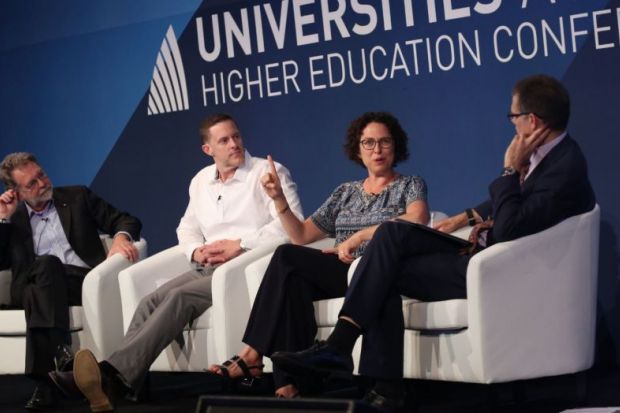Australia’s government has done its universities few favours by not engaging more comprehensively in China’s Belt and Road Initiative, while universities have let Australia down by failing to convey the initiative’s significance, a conference has heard.
James Laurenceson, deputy director of the University of Technology Sydney's Australia-China Relations Institute, said the government had wrongly characterised the BRI – President Xi Jinping’s £750 billion plan to extend Chinese influence across Eurasia, through overland and maritime trade routes – as almost entirely about infrastructure.
He told the Universities Australia conference that education was “absolutely relevant” to the initiative, with the Chinese emphasising people-to-people “connectivity” as a key facet.
“You have the Chinese Ministry of Education having its own Belt and Road plan, talking about how China wants to develop joint education, training and research programmes,” said Professor Laurenceson.
“If Australian universities are going to engage with China – attracting students, expanding joint research facilities – then hooking into the Belt and Road is going to give [them] better success than they would otherwise have. Why? Because it matters to China.”
Professor Laurenceson said the BRI presented Australian universities with “clear challenges, clear risks and clear opportunities”. Competition for students would be one of the “certain sources of risk”.
He said Australia’s higher education sector had not been “particularly well served” by the federal government’s approach to the initiative, which was restricted to cooperation on building infrastructure in “third” countries – thereby “completely missing the education space in the BRI story”.
“Like many things to do with China, the impacts are going to be complicated,” Professor Laurenceson added. “If you hear a simple story of the Belt and Road, it’s almost guaranteed to be wrong.”
Jane Golley, acting director of the Australian Centre on China in the World at the Australian National University, said the BRI raised “complex questions to which none of us have the answers”. Assessments ranged from seeing it as a genuine attempt to boost income across the Asia Pacific to a “malevolent intent” to trap neighbours in debt.
The former could increase mobility throughout the region and give Australia “more foreign students as a result”, said Dr Golley, The latter would force Australia to “prepare for difficult times ahead”.
“We need to continue to explore ways to cooperate with China where we can, to compete with them where and when it makes sense, and to challenge them where we have to. A good example of that is academic freedom. It’s a bottom line that we shouldn’t cross," she said.
Hugh White, of the ANU’s Strategic and Defence Studies Centre, said the BRI and China’s rise more broadly had saddled Australia with the most difficult foreign policy challenge it had ever faced. He said Australia had never before had such an important relationship with a country that was not also an ally.
“They’re not our mates,” Professor White said. “They’re not necessarily an enemy, but they’re not our mates.”
He said Australia was “in denial” about the changing world order, with China’s GDP set to almost double that of the US by 2030, according to some estimates. He added: “It poses questions over whether our universities are doing as much as they should to foster debate here in Australia.
“In terms of strategic studies in international relations, what contribution have we made to actually understanding what’s going on? Not much.”
Register to continue
Why register?
- Registration is free and only takes a moment
- Once registered, you can read 3 articles a month
- Sign up for our newsletter
Subscribe
Or subscribe for unlimited access to:
- Unlimited access to news, views, insights & reviews
- Digital editions
- Digital access to THE’s university and college rankings analysis
Already registered or a current subscriber? Login










